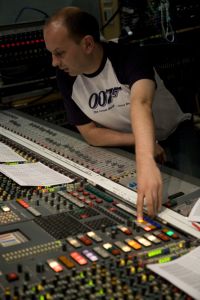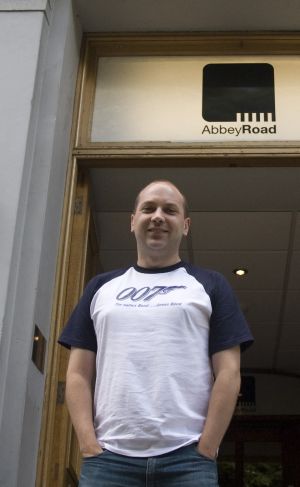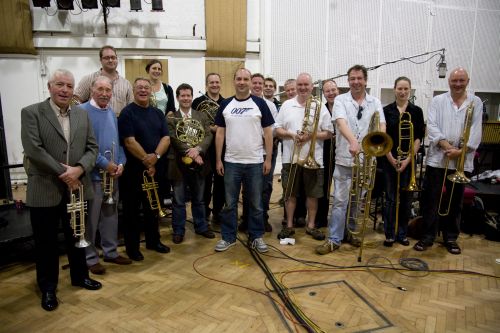|
También en español
Years later after our previous interview with Richard Jaques regarding his excellent works for the two Headhunter title, we had recently the chance to speak again with him. A lot of water has flowed under the bridge since then, and now he is one of the most top rated composers in the videogame industry. As proof of that, he's been in charge of writing the music for the latest adventure of the most famous British spy, 007. We are talking about the videogame James Bond: Blood Stone which features a story written by one of the regular writers of the franchise and the voices of the movie actors
Judi Dench y Daniel Craig.
 Bsospirit: Hi Richard, it's a real pleasure to talk to you again. You're very kind. In our last chat, we talked about your remarkable jobs for Headhunter I and II and you were fully involved in the process of writing the score for "Starship Trooper the Game". When you look back to this time, did you were finally happy with the outcome of your professional collaboration in this last game? Bsospirit: Hi Richard, it's a real pleasure to talk to you again. You're very kind. In our last chat, we talked about your remarkable jobs for Headhunter I and II and you were fully involved in the process of writing the score for "Starship Trooper the Game". When you look back to this time, did you were finally happy with the outcome of your professional collaboration in this last game?
Richard Jacques: Thank you, it's wonderful to talk with you again! I was indeed busy with the score to Starship Troopers last time we spoke, and yes I was very happy with the way the score turned out. It has been described by many as a 'Symphony of Bombast' as it retains all the of action from the movies, along with some of the tongue-in-cheek elements of the writing and direction style, and pays homage to Basil Poledouris' scores from the films whilst retaining my signature sound. So yes, I was very happy with the results.
BS: The score was very amazing but finally it didn't' get release. Do you think sometime in the future we will be able to enjoy your music out of the game?
RJ: Sadly this is true, and it's a shame that there aren't more scores released, especially as it it's so easy now with digital download and very cheap to produce physical CD's. Of course it is also complicated with working on projects that are derived from existing film intellectual properties as there are various copyright considerations. You never know, in future years you may see a 'best of' compilation or such like, of my various works. It's very encouraging that there are a large number of people who contact me asking about the availability of the score, so there is clearly a market there.
 BS: A lot of your scores are videogames. It seems you are specializing in this kind of products. Is this something you're looking for or it's just something that happens at random? BS: A lot of your scores are videogames. It seems you are specializing in this kind of products. Is this something you're looking for or it's just something that happens at random?
RJ: I would say that it happens at random, and I take on all kinds of projects, not just games. I'm currently in talks to score some upcoming animated films in the future which I'm looking forward to. In the past year alone I have also composed for BBC TV and worked on a high profile campaign for Mercedes Benz, so I get asked to compose for many different projects and media, and I enjoy the variety as it helps keep me fresh as a composer. Of course I enjoy working on large orchestral scores and so I try to choose those projects, regardless of the medium involved.
BS: Do you think that the videogame industry can be a launchpad for young composers?
RJ: I think that's true to a certain degree, but the standard is so high now that young composers really need to be properly musically trained and experienced if they are to pursue a career such as this. There are many young composers who contact me who know how to use some music software but they don't have any concept of real orchestral composition, orchestration, arranging, score preparation, recording and mixing techniques, and many people may only play a small amount of keyboard or guitar. My advice would be to learn as much as you can from a very early age, play in orchestras (and other ensembles) and study composition and orchestration techniques, and get together small ensembles to record your music. There is nothing like actually going out there and doing it.
BS: After listening to the most recent videogame soundtracks, one comes to the conclusion that lately there is much more talent in the videogames industry than in any other, including the movie industry. Do you think that videogame composers share this feeling?
RJ: Yes I think there is a clear 'A' list of composers working in games that have been coming to the forefront in the past, say 3-5 years, but I wouldn't say they are better or worse than those in the film industry. It is encouraging to see the video game industry growing, and taking music more seriously, and we are no longer a poor relation of the movie or TV industries, but have some of the most talented and creatively groundbreaking composers around. I am sure that most composers working in this field would agree.
BS: After that you started your work in one of the best videogames in history, and I mean it. I'm talking about "Mass Effect". How do you get involved in this amazing product from Bioware?
RJ: I was working on a team with three other composers, Jack Wall, Sam Hulick and David Kates. It was of course an amazing project to be involved with, and I was recommended by BioWare to one of the other composers who invited me on board. I scored a large amount of the cinematics, of which a few tracks were used in the game and have been used on recent downloadable content.
 BS: In this score you worked with a lot of other composers. How did you manage to create a consistent work and not to end with a real mess with very different sounds and styles? BS: In this score you worked with a lot of other composers. How did you manage to create a consistent work and not to end with a real mess with very different sounds and styles?
RJ: We were all in very regular contact with one another and really had a great degree of trust in what each composer was doing, so there was a great team spirit and of course we all wanted to produce great music. We also exchanged some sound patches to maintain consistency (especially for the electronic elements), and swapped some thematic and motivic ideas.
BS: Finally the music had a lot of electronic presence, more Blade Runner type. Don't you think that a score with more orchestra components, star wars-like, would have been a more interesting approach from a composer's point of view?
RJ: Not necessarily, and perhaps that would have been a bit too obvious. BioWare were keen on having a mixture of both elements from the start, and I think this was the right approach. As composers we don't always want to take a blueprint of something that has already gone before, but like to innovate, and so it's always good to try new approaches.
BS: What is your best memory of working in this game?
RJ: I would have to say it was scoring "The Citadel" cinematic, where the players sees this gigantic space station for the first time, and the Normandy ship comes in to dock. It is a true cinematic moment. I also think the characters and story are absolutely superb.
BS: Why do you think they didn't call you for the second part?
RJ: Well I was actually due to work on Mass Effect 2 last year with the rest of the composing team, but I was very busy with James Bond 007: Blood Stone as we needed to write yet more material for the game so sadly the schedules didn't work out. Perhaps Mass Effect 3?
BS: I have to tell you something in the name of all your fans. Thank you for the ÒOscar NightÓ theme from the ÒYou're in the moviesÓ videogame. It was nominated for Game Audio Network Guild Award in the Best Original Instrumental category. What were your influences in the writing of this theme?
RJ: Thank you! Yes that was a fun project to work on. I already had a great relationship with the Audio Director of that project, and regarding that particular track, which plays at the beginning of the game, he simply said to me "think Oscar night", and I knew exactly what he wanted. As the game features many movie settings and pastiches it needed to set the scene of the game, so I wrote it quite quickly and it was approved immediately and became known as "Oscar Night." In terms of influences I guess I was just inspired by what an Oscar Night theme would mean to me, incorporating all things Hollywood. It was great fun!

BS: Let's talk about James Bond 007: Blood Stone. How do you get involved in this project?
RJ: I was selected as the composer for James Bond 007: Blood Stone after submitting some demo material, but also because I had worked previously with the developer of the game, Bizarre Creations, and I have many friends and colleagues associated with the James Bond franchise. For example, one of my long term friends and collaborators has been both music editor and sound supervisor on the Bond movies, and I have worked on an album with Shirley Bassey. So, you could say that all the pieces of the jigsaw came together naturally. Also I'm known for creating large action scores, and my music from Headhunter was even described as "the perfect James Bond score".
BS: When you finally get the big job, how did you face it? Did you set some kind of goals or challenges for yourself? Do you think you have achieved them?
RJ: I wanted to create a score and a sound that was a very 'classic Bond' soundtrack, and because this was a game, to create music that enhances the gameplay, and contained the right amount of high and low points, as well as following the narrative thematically. I feel like I have achieved everything I set out to do.
BS: Did the producers tell you the path to follow, such as to keep the kind of sound David Arnold has used in the last films, or did you have some freedom to create your own Bond sound?
RJ: Of course on a project like Bond, any composer would want to be respectful of the music that has gone before, and I am no different in that respect, so of course the music of John Barry and David Arnold is very important to the overall Bond sound. I also wanted to retain my style of action scoring. The score itself had to be a 'modern' Bond sound, using modern production techniques so that it was very much a Daniel Craig Bond score. I also had plenty of freedom and the score contains all brand new themes which I composed, since the story is not connected to a film, and so it was a great experience to write new themes for all the various characters and settings throughout the game.
 BS: This is not the first time you record on Abbey Road, but recording music for James Bond on Abbey Road has to be a unique experience, isn't it? BS: This is not the first time you record on Abbey Road, but recording music for James Bond on Abbey Road has to be a unique experience, isn't it?
RJ: I have indeed recorded a few scores at Abbey Road, and it's a great place to work. Scoring James Bond there was certainly a very unique experience, and very rewarding.
BS: Did you have the chance in the past of working with so many musicians and with so great talent as the ones you have worked with in James Bond: Blood Stone?
RJ: I am fortunate to work with many, many great musicians all over the world; James Bond 007: Blood Stone was no exception. As a trombonist myself, I studied jazz as well as symphonic writing as part of my education, so I guess that is why I felt very comfortable with this kind of writing. Many of the musicians involved in the project have performed on the Bond movies so it was very important to me to involve the right musicians to get the perfect Bond sound right from the start. We also recorded drums in a big nightclub here in the UK, as well as various ethnic instrumentation and percussion, and my friend Steve Ouimette (Guitar Hero) did an amazing guitar performance of 'The James Bond Theme' (Monty Norman). So yes it was a very large-scale production involving many amazing musicians.
BS: Do you think that there is in fact some parallelism between James Bond 007: Blood Stone and your previous works for the two Headhunter videogames?
RJ: Quite a lot of people have mentioned that and it's funny as Headhunter is nearly 10 years old now! Of course there are some similarities because they are both large action scores, they both have bold thematic content as well as live orchestra and some electronic production. So yes, I would say there is some parallel between the two.
BS: I guess that over the years you have been following the works of the different Bond composers. Which is your favorite soundtrack?
RJ: I would have to say "You Only Live Twice" (John Barry), "The World Is Not Enough" (David Arnold) and I also love the Michael Kamen score to "License To Kill".
BS: Your soundtrack for James Bond 007: Blood Stone is a real roller coaster ride, a lot of fun when you listen to it out of the game. However, it is its perfect fusion with the game experience what creates the magic. Can it be the reason that you have worked at all times with final material and not with sketches and concept art material?
RJ: Actually a lot of the Blood Stone score was composed with just a few ideas between the music supervisor and myself, as the game was still being developed. I would say that for most composers, it's not always about each note you write, but also about your imagination and interpretation of situation / character / emotion. So when I was scoring a car or speedboat chase, I wrote most of these sections without seeing any of the game, but obviously I know games and I know the Bond movies so I knew what I was going to compose and how I was going to approach it. I scored the cut scenes (cinematics) to picture.
BS: Do you think James Bond 007: Blood Stone is your best work?
RJ: Absolutely, yes.
BS: Can you tell us something about your future projects?
RJ: I am currently working on a few unannounced game and TV projects, as well as building a new studio facility in London for myself and my team, which is very exciting. I am also looking forward to new challenges next year.
BS:We have finished, Richard. Thank you very much for you kindness and for your time in this interview.
RJ: Thank you very much!

Interview by David Doncel and Oscar Rivas.
|





